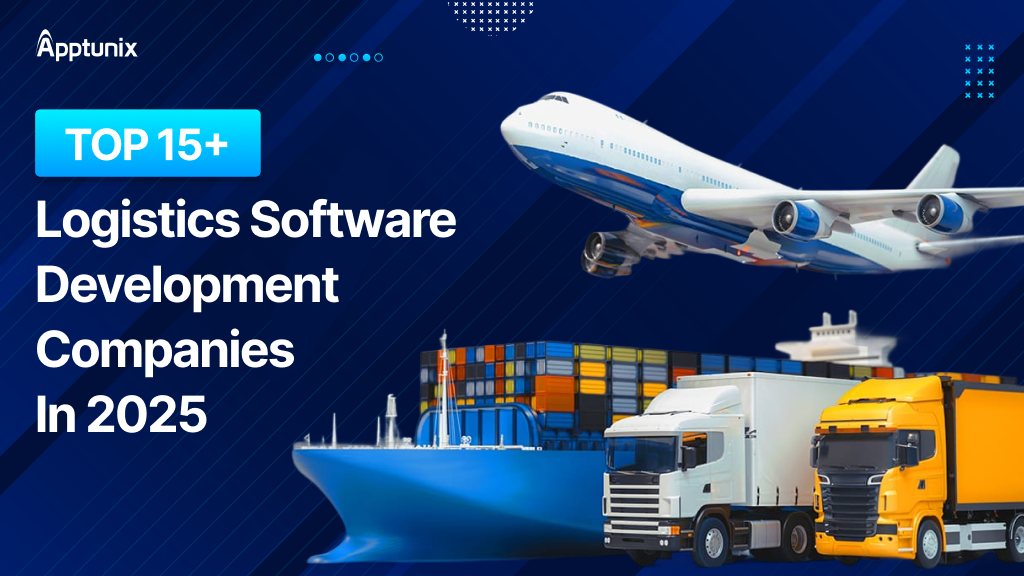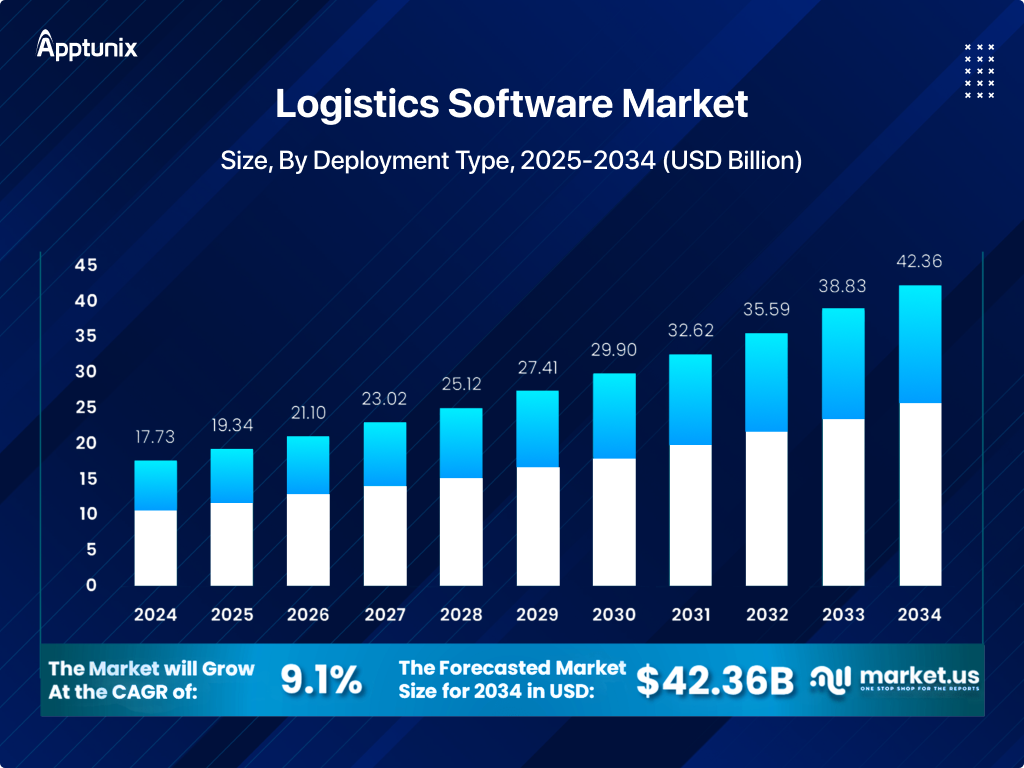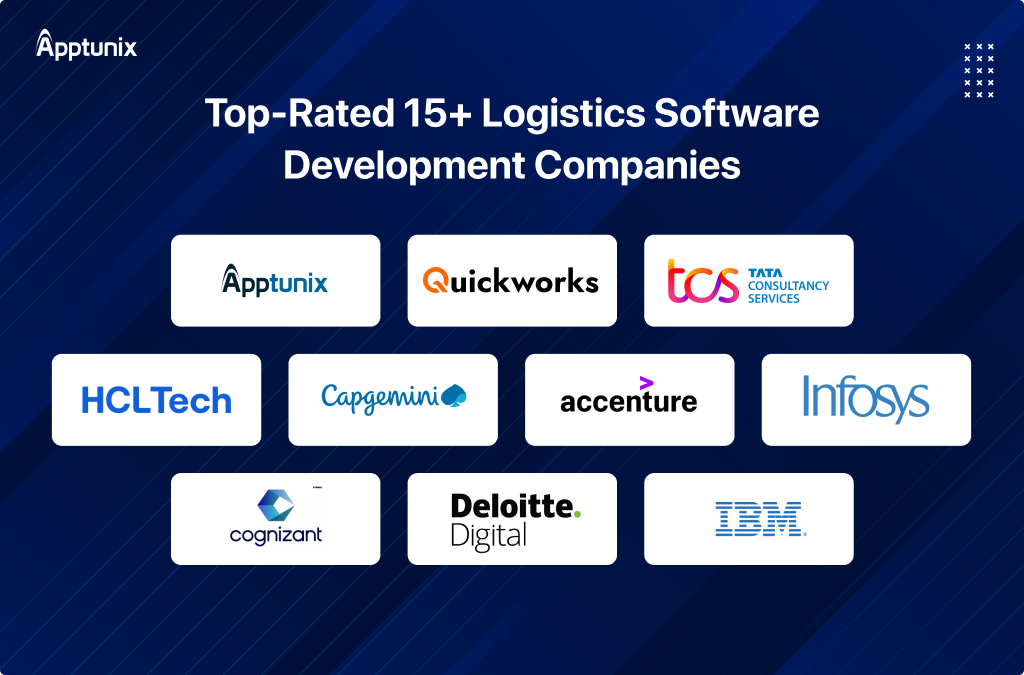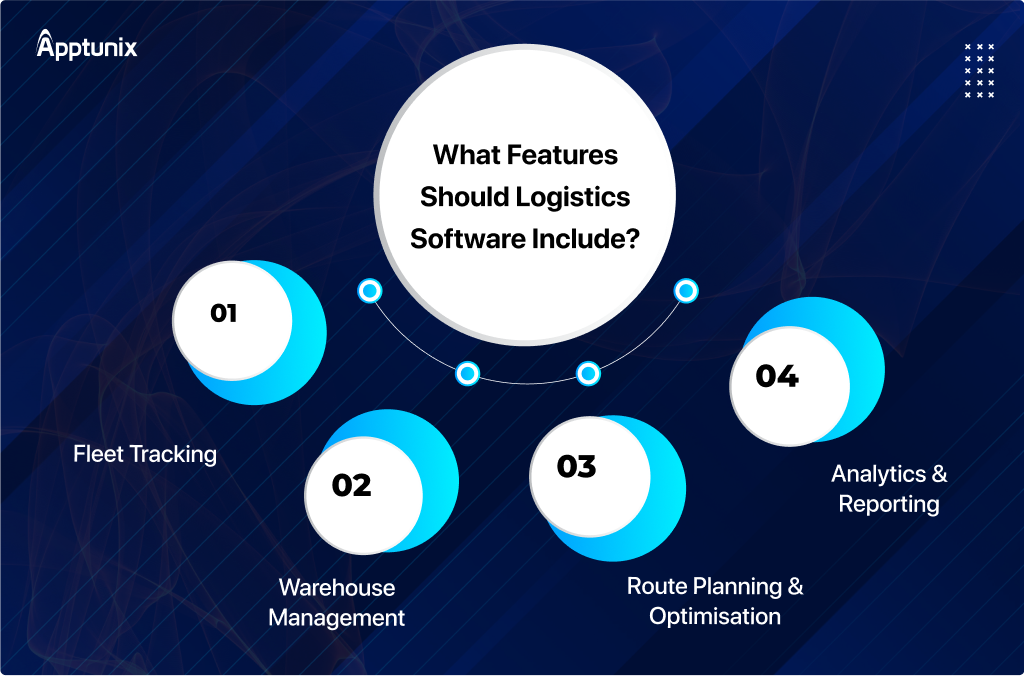
Postmates Business and Revenue Model: How Does Postmates Work?
86 Views 13 min September 30, 2025


Logistics has always been about timing, coordination, and visibility. Managing these things at scale will be impossible without the right digital systems in place. That’s why logistics software development companies have quietly become the backbone of global transportation and supply chain management.
The logistics software market is projected to surpass $25 billion by 2030 globally, growing at a CAGR of more than 10%. Businesses that previously relied on spreadsheets are now partnering with the best logistics management software development firm to modernise their operations.
This blog will spotlight the 15+ top logistics software development companies in 2025, highlight what makes them stand out, and help you understand what to look for in a partner if you’re considering building your own logistics solution.
Here’s the thing: logistics is no longer a back-office function. It’s a competitive advantage. Companies that get logistics right deliver faster, operate leaner, and win more customer trust. That advantage now comes directly from technology.

Transportation and logistics software development has moved far beyond basic shipment tracking. Today, we’re talking about AI-driven demand forecasting, predictive route optimization, IoT-enabled fleet management, blockchain-based audit trails, and real-time supply chain visibility.
Customers expect same-day delivery. Manufacturers are under pressure to control complex global supply chains. Retailers want insights that predict what to stock before demand spikes. 3PLs (third-party logistics providers) are competing on technology just as much as on price.
The opportunities are massive. E-commerce logistics spending is expected to hit $1.6 trillion by 2027, fueled by same-day delivery expectations and cross-border trade. That kind of growth signals one thing: businesses that don’t invest in logistics software risk being left behind.
That’s where the right logistics software development company comes into play. Off-the-shelf tools might get you part of the way, but they rarely scale with your business model or capture the complexity of modern supply chains. A custom solution built by expert logistics software development services gives you systems designed for your workflows, your markets, and your growth plans.
Also Read: AI in Supply Chain Management
Here’s the thing: logistics is now about data, visibility, and speed. That’s where modern logistics software development services deliver tangible business impact.
With transportation and logistics software development, companies are slashing delivery costs by as much as 15–25%. Route optimisation, smart dispatch, and predictive fleet maintenance all cut wasted miles and idle time. For example, a mid-sized 3PL can save millions annually by reducing fuel consumption and unplanned downtime.
Growth often exposes weak points in logistics. A business doing 5,000 shipments a month can’t rely on spreadsheets when scaling to 50,000. Fleet management software development enables scaling with automation—assigning drivers, monitoring loads, and generating compliance reports—without requiring a proportional increase in staff.
Today’s customers expect real-time updates. Logistics software provides tracking portals where clients or end-consumers can see the status of every shipment. This level of transparency builds trust and reduces customer service overhead. For industries like healthcare or perishable goods, this isn’t just nice to have—it’s critical.
Every industry has its quirks. Retailers need fast last-mile delivery. Manufacturers require effective vendor coordination and efficient warehouse syncing. Cold-chain logistics need temperature tracking. A custom logistics software development company designs features to match these demands, unlike generic SaaS tools.
The top logistics software development companies are already building AI-driven forecasting tools, digital twins for warehouses, and blockchain-based contract management. Businesses investing now are positioning themselves ahead of competitors by using logistics as a revenue driver.
Let’s be blunt: the companies investing in logistics tech today will dominate tomorrow. With logistics app development services, businesses can launch new delivery models (like hyperlocal or on-demand) faster, adapt to global supply chain disruptions, and capture market share while others are still “figuring it out.”
Finding the right partner is about who understands the real complexities of supply chains, transportation, and global logistics. The best logistics software development companies don’t just deliver apps; they deliver solutions that keep trucks moving, warehouses efficient, and customers happy.
Here are the top logistics software development companies in 2025 you should have on your radar:

1 ApptunixApptunix is widely recognised as one of the best logistics software development companies for businesses that need custom solutions. From logistics management software development to fleet management software development, Apptunix builds platforms that are scalable, secure, and future-ready. Their expertise spans transportation and logistics software development, predictive analytics, IoT-based fleet tracking, and logistics app development services. Apptunix has worked with startups, enterprises, and 3PL providers across the globe, positioning itself as a trusted custom logistics software development company that can adapt to any business model.
2 QuickworksQuickworks has carved out a strong position in the logistics tech space by delivering logistics app development services that are fast, reliable, and adaptable. Known for building white-label delivery solutions, Quickworks helps logistics providers, e-commerce companies, and transportation firms launch digital platforms quickly. Their strengths lie in logistics management software development and supply chain automation, making them a go-to for businesses that want to digitize operations without starting from scratch. For companies looking to streamline delivery operations or build hyperlocal logistics platforms, Quickworks consistently delivers.
3 InfosysInfosys is a worldwide leader in logistics software development, recognised for its enterprise-level solutions. It is a supply chain software development company that combines ERP systems with logistics and warehouse platforms for large enterprises. Its services include fleet management software development, transportation planning, and AI-driven predictive analytics. With clients from the manufacturing, retail, and energy industries, Infosys remains a first-rate choice for companies that need solid and scalable logistics solutions globally.
4 TCS (Tata Consultancy Services)TCS is among the leading logistics software development firms for enterprise customers. Their services cover logistics management software development, fleet optimisation, and warehouse digitalisation. TCS also provides customized transportation and logistics software development in sectors such as automotive, retail, and e-commerce. With an extreme emphasis on end-to-end digital transformation, TCS enables companies to simplify operations, minimise costs, and increase delivery times.
5 CognizantCognizant is usually ranked as one of the top logistics software development firms due to its focus on automation and deep analytics. They are experts in custom software development for logistics that incorporates real-time tracking, IoT enablement, and AI-based insights. Cognizant also assists businesses with fleet management software development and predictive demand forecasting, enabling companies to perform with efficiency and robustness.
6 CapgeminiCapgemini has established a solid reputation as a software development firm for supply chain software, catering to large companies. Their strength is in logistics management software development with specialised emphasis on warehouse automation, demand planning, and analytics dashboards. Capgemini also assists companies with logistics app development services specific to customer-facing delivery operations, making them a go-to partner for digital transformation in logistics.
7 AccentureAccenture marries strategy with execution, making it one of the leading logistics software development firms for businesses. Their logistics software development solutions cover transportation management, supply chain analytics, and blockchain-transparency-enabled solutions. Ranked for working with a few of the world’s largest retailers and manufacturers, Accenture emphasises delivering quantifiable results through bespoke platforms crafted to optimise global supply chains.
8 Deloitte DigitalDeloitte is a consulting giant that also offers business logistics software development services to companies that are transforming digitally. Their services range from transportation and logistics software development to high-end demand forecasting and automation of logistics. Deloitte is unique in that it offers both advisory and technical implementation, thus becoming the choice for companies seeking strategy-based tech partners.
9 IBMIBM is the leading, most innovative logistics software development firm, utilising AI, blockchain, and IoT to revolutionise logistics operations. The company offers fleet management software development, real-time visibility platforms, and AI-driven logistics forecasting. IBM’s logistics solutions are relied upon by multinational businesses requiring high transparency, security, and automation in their supply chains.
10 HCLTechHCLTech is a strong player in custom logistics software development with expertise in cloud-native logistics platforms. Their portfolio includes logistics management software development, fleet optimisation, and digital warehouse solutions. HCLTech also offers transportation and logistics software development for enterprises managing large-scale distribution networks, ensuring scalability and real-time performance.
11 Tech MahindraTech Mahindra has become a go-to supply chain software development company for businesses in telecom, retail, and manufacturing. They specialise in fleet management software development and connected logistics solutions powered by IoT. Their expertise in logistics app development services helps businesses streamline last-mile delivery and improve customer experience, making them a trusted digital partner.
12 EPAM SystemsEPAM delivers logistics software development services focused on usability, scalability, and real-time operations. Their offerings cover logistics management software development and enterprise-grade transportation and logistics software development. EPAM’s strength lies in building modern, cloud-native applications with strong UX, serving logistics providers and enterprises alike.
13 EPAM SystemsIntellias has become a mid-market and enterprise-level custom logistics software development firm. Logistics app development services, real-time fleet tracking, and logistics marketplace platforms are their core areas of expertise. Intellias specialises in creating customised solutions that are efficient, scalable, and adaptable in nature, which is why they are in high demand in the market for small and medium-sized businesses.
14 OxagileOxagile is a mid-sized software development company specialising in logistics that has deep experience in delivery management platforms. They have expertise in creating logistics management software and offering logistics app solutions for companies looking to digitise their business processes quickly. Oxagile’s expertise is in creating scalable delivery ecosystems and providing cost-effective services for e-commerce and retail companies.
15 ELEKSELEKS offers logistics software development solutions centred on sophisticated analytics and supply chain transparency. Their services range from fleet management software development to transportation planning and warehouse automation. ELEKS caters to European and North American enterprises, enabling them to streamline logistics operations with increased transparency and efficiency.
16 ScienceSoftScienceSoft is a reliable custom logistics software development firm with decades of experience in the IT sector. It provides services such as logistics management software development, delivery tracking solutions, and AI-driven route optimisation. ScienceSoft is renowned for its consulting-first methodology by which it assists organisations in developing solutions tailored to long-term growth strategies.
17 AndersenAndersen is a developing name in the list of leading logistics software development firms. They offer logistics app development and supply chain software development with a vested emphasis on automation, AI, and data-driven decision-making. Andersen’s customized solution makes them a trustworthy partner for businesses that need to grow logistics operations through technology.
Also Read: How to Build a Logistics Management Software
Choosing from dozens of logistics software development companies can feel overwhelming. The truth is, not every vendor has the skills to deliver scalable, future-ready solutions. If you’re wondering how to select a logistics software development partner, here’s the playbook:
Any vendor can say they build apps, but you want proof. Request case studies on transportation and logistics software development or fleet management software development. A strong partner will show how they’ve helped other businesses reduce delivery times, automate routing, or expand into new markets.
A supply chain software development company with deep knowledge of your industry is gold. Logistics for e-commerce isn’t the same as for pharma or heavy equipment. If they’ve solved compliance issues, real-time inventory challenges, or cross-border logistics before, you’re in safer hands.
Top companies don’t just code—they know the tech that drives results. That includes AI for demand forecasting, IoT for fleet monitoring, and blockchain for supply chain security. If they’re offering outdated stacks or generic tools, that’s a red flag.
Software isn’t “done” once it’s live. You’ll need upgrades, bug fixes, and new features as your business grows. The best logistics software development company will treat you like a long-term partner, not a one-off client.
A credible custom logistics software development company won’t lure you in with unrealistically low costs or impossible delivery dates. Instead, they’ll explain what affects cost—features, scale, integrations—and work with you on realistic roadmaps.
Red Flags You Shouldn’t Ignore
The cost to build logistics software depends on what you’re building, who you partner with, and how ambitious your roadmap is. A logistics app for a regional delivery service is not going to cost the same as a platform designed to manage a multinational supply chain.
Here’s a quick look at the ranges most businesses can expect:
Adding AI, blockchain, advanced analytics, or predictive route optimization significantly increases costs. But here’s the tradeoff: these features also directly impact efficiency, margins, and customer satisfaction.
Modern logistics platforms rarely work in isolation. Connecting with ERPs like SAP or Oracle, CRMs like Salesforce, and third-party APIs for payments or mapping can double development hours—but they’re essential for enterprises that want seamless workflows.
A regional MVP costs less than building a multi-country platform with real-time global visibility. The number of warehouses, fleets, and locations supported will directly influence the budget.
Partnering with a supply chain software development company in North America or Western Europe is more expensive than working with skilled teams in Asia or Eastern Europe. Many businesses opt for hybrid models, maintaining a local strategy while outsourcing development to reduce costs without compromising quality.
One overlooked cost is ongoing support. Updates, bug fixes, cloud hosting, and feature upgrades typically add 15–20% of the initial logistics software development cost annually.
The Bigger Picture
Here’s what businesses need to remember: logistics software development services are not an expense; they’re an investment. The best logistics software development company won’t just hand you an app—they’ll build a system that cuts inefficiencies, reduces operating costs, and opens new revenue streams.
Consider this: a retailer saving 8% on transportation costs through AI-powered optimisation can recover their development investment in under a year. For 3PL providers, fleet utilisation alone can drive millions in savings.
The best way to distinguish between average and top logistics software development companies is by examining the features they incorporate into their solutions. Strong functionality is what transforms software from a nice-to-have tool into a competitive advantage.

Fleet Tracking: Any serious fleet management software development company will tell you this is non-negotiable. GPS-enabled fleet tracking reduces downtime, prevents misuse, and ensures every vehicle is where it should be.
Warehouse Management: From inventory checks to barcode scanning, this feature is critical for retailers and manufacturers who need tighter control of stock.
Route Planning & Optimisation: A core deliverable of any transportation and logistics software development company. Smart routing cuts delivery times, saves fuel, and keeps customers satisfied.
Analytics & Reporting: Without insights, you’re flying blind. Strong reporting capabilities allow businesses to measure performance, spot inefficiencies, and make data-driven decisions.
AI-Powered Forecasting: Predict demand spikes, allocate resources ahead of time, and minimise bottlenecks. A key indicator of the best logistics software development company is its ability to integrate AI in meaningful ways.
Blockchain for Transparency: A game-changer for compliance-heavy industries like pharma. It creates tamper-proof records and improves supplier trust.
Multi-Language & Multi-Currency Support: Essential if you’re scaling globally. Any custom logistics software development company worth hiring should be able to build this.
Integration-Ready APIs: Modern logistics software should seamlessly integrate with ERPs, CRMs, and payment gateways.
IoT & Telematics: IoT-enabled sensors for vehicles and shipments ensure real-time condition monitoring, critical for cold-chain and high-value goods.
The logistics industry in 2025 is more connected, more intelligent, and more demanding than ever. Businesses no longer want just another tracking app: they want end-to-end platforms that anticipate problems, optimise costs, and make supply chains resilient. That’s exactly where the top logistics software development companies are focusing their innovation.
The future of logistics is proactive, not reactive. AI models can now predict demand surges, reroute deliveries before traffic becomes an issue, and even identify patterns that reduce warehouse bottlenecks. The best logistics software development company integrates AI as a core engine for decision-making.
Global supply chains face constant risks: counterfeit products, compliance issues, and delays. By partnering with a supply chain software development company that uses blockchain, businesses gain a transparent, tamper-proof record of every transaction—building trust across all stakeholders.
Vehicles, cargo, and even warehouses are becoming smart assets. A fleet management software development company can embed IoT sensors that track everything from driver behavior to cargo temperature. This real-time data minimises risks, cuts maintenance costs, and improves customer satisfaction.
Sustainability is a core requirement. Transportation and logistics software development companies are designing eco-conscious solutions: carbon tracking dashboards, electric fleet optimization, and AI-driven fuel savings. These also align with government policies and customer expectations.
Also Read: 3 Challenges Facing the Logistics Industry and How Software can Help
Here’s the reality: plenty of vendors call themselves custom logistics software development companies, but very few can actually combine innovation with execution. Apptunix stands out because we design growth engines.
What sets Apptunix apart among the top logistics software development companies is our ability to translate complex supply chain needs into scalable, user-friendly solutions. Apptunix has delivered projects for enterprises, SMEs, and startups across industries like eCommerce, healthcare, retail, and manufacturing. Each solution is built with scalability, compliance, and future-readiness in mind. That’s why businesses looking for the best logistics software development company trust Apptunix for a long-term partnership.
A regional logistics firm came to us struggling with late deliveries, inconsistent customer updates, and rising fuel costs. They had tried off-the-shelf software before, but it couldn’t scale with their needs.
We built them a tailored fleet management software development solution with live GPS tracking, automated route planning, and integrated driver performance dashboards. Within the first quarter of rollout, they saw:
The best part?
Their leadership now has data-driven insights to expand into new markets with confidence. That’s what happens when logistics stops being a headache and starts becoming a growth engine.
Logistics has shifted from being a support function to becoming one of the most powerful levers of growth. In 2025, companies that treat logistics as a strategic asset are the ones building customer trust, controlling costs, and staying ahead of market disruptions. And the engine behind that transformation? Purpose-built logistics software.
That’s why businesses are turning to the top logistics software development companies to modernise their supply chains. But here’s the catch: not every partner will understand your challenges, your scale, or your vision. This is where Apptunix makes the difference.
As a custom logistics software development company, Apptunix doesn’t deliver cookie-cutter apps. We design platforms that match your workflows, adapt to your growth, and bring in the latest tech, whether that’s AI-driven forecasting, IoT-enabled fleet management, or blockchain-based transparency.
If you’re serious about building logistics software that gives you speed, control, and competitive advantage, Apptunix is ready to help. Let’s talk today and create a logistics solution built for your future.
Q 1.What do logistics software development companies do?
Logistics software development companies design digital platforms that help businesses manage supply chains, fleets, inventory, and deliveries. They offer solutions like fleet management software development, logistics app development services, and logistics management software development to streamline operations, reduce costs, and increase transparency.
Q 2.How long does it take to develop a logistics software solution?
The timeline depends on complexity. A basic MVP can take 8–12 weeks, mid-level solutions 3–6 months, and enterprise-grade platforms 6–12 months. Partnering with a custom logistics software development company ensures development is efficient and aligned with your business goals.
Q 3.How do I choose the best logistics software development company?
Choosing the best logistics software development company requires evaluating expertise in transportation and logistics software development, prior experience in your industry, technology stack, scalability, and post-launch support. A trusted partner will provide custom logistics software development services tailored to your unique workflows.
Q 4.What is the cost of logistics software development?
Costs vary based on features, complexity, and scale. Basic MVPs start around $30,000, mid-level apps range $70,000–$120,000, and enterprise-grade platforms with AI, IoT, and blockchain integrations often exceed $150,000. Working with a custom logistics software development company ensures you invest in solutions that scale efficiently.
Q 5.Which industries need logistics software?
Industries such as e-commerce, retail, manufacturing, healthcare, pharmaceuticals, food delivery, and last-mile logistics heavily rely on logistics software development services. A supply chain software development company can tailor solutions to each industry’s unique operational requirements.
Q 6.What features should logistics software include?
Essential features include fleet tracking, route optimisation, warehouse management, analytics dashboards, and real-time shipment tracking. Advanced platforms may also include AI forecasting, IoT-enabled sensors, blockchain tracking, and multi-location support, delivered through logistics app development services.
Q 7.Can logistics software integrate with existing systems?
Yes. Top logistics software development companies provide integration with ERP, CRM, payment gateways, IoT devices, and other enterprise tools. Proper supply chain software development ensures seamless data flow across platforms for better visibility and decision-making.
Get the weekly updates on the newest brand stories, business models and technology right in your inbox.
Book your free consultation with us.
Book your free consultation with us.





